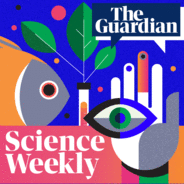Madeleine Finlay and Ian Sample discuss three intriguing science stories from the week. From a hint at alien life on a distant planet to a clue in the search for answers over why colon cancer rates are rising in the under 50s, and news from scientists who claim to have found a colour no one has seen before. Help support our independent journalism at theguardian.com/sciencepod

Wissenschaft & Technik
Science Weekly Folgen
Twice a week, the Guardian brings you the latest science and environment news
Folgen von Science Weekly
300 Folgen
-
Folge vom 24.04.2025Evidence of alien life, a clue about the rise of bowel cancer, and a new colour?
-
Folge vom 22.04.2025Is ‘de-extinction’ really possible?The American biotech company Colossal Biosciences recently made headlines around the world with claims it had resurrected the dire wolf, an animal that went extinct at the end of the last ice age. But does what the company has done amount to ‘de-extinction’ or should we instead think of these pups as genetically modified versions of the grey wolves that exist today? Science correspondent Nicola Davis tells Madeleine Finlay about the process that created these wolves, how other companies are joining the effort to use genetic modification in conservation, and why some experts have serious ethical questions about bringing back species whose habitats no longer exist. Help support our independent journalism at theguardian.com/sciencepod
-
Folge vom 17.04.2025RFK Jr’s mixed messages on vaccinesAs a measles outbreak expands across the US, comments by health secretary Robert F Kennedy Jr have come under scrutiny. Kennedy has said that the best way to prevent measles is to get vaccinated – but he has also caused alarm among paediatricians, vaccine experts and lawmakers by promoting vitamin A and nutrition as treatments for measles and questioning the safety testing of the MMR vaccine. He also recently announced a US-led scientific effort to establish the cause of what he terms the ‘autism epidemic’, with some experts concerned that this study will support the widely discredited association between autism and vaccines. US health reporter Jessica Glenza tells Ian Sample, the Guardian’s science editor, how these mixed messages are already impacting scientific research.. Help support our independent journalism at theguardian.com/sciencepod










